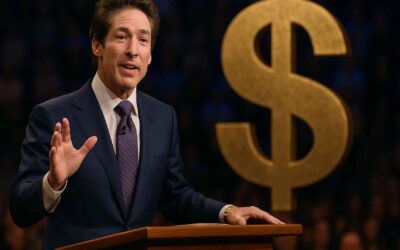Somewhere in a ministry conference hall, a keynote speaker steps onto a stage lit with soft blues and amber spotlights. The screen behind him glows with a trendy catchphrase—something like “ReThinking Church” or “The Future of Worship.” The audience, mostly pastors and ministry leaders, listens attentively as the speaker begins to dismantle traditional ecclesiology with charisma and TED Talk pacing. It’s a familiar setting, repeated in conference after conference across the American evangelical landscape. And it represents a dangerous trend: the relentless, restless reinvention of the Church.
We’ve seen this for decades now. Every few years, a new book claims to have found “the key” to revitalizing or rebuilding the Church. Some offer sociological insight, others lean on marketing data, a few rely on business strategy. They’re packaged with urgency: If we don’t change now, we’ll lose the next generation. If we don’t innovate, we’ll become irrelevant. If we don’t adapt, we’ll die.
And so, churches pivot. They rebrand. They rename. They redesign the sanctuary. They rewrite mission statements. They throw out hymnals for light shows. They trade catechism for coffee shops. They replace the pulpit with a platform and preaching with conversation. They are always in motion—always rethinking, rebooting, reimagining, rediscovering, rebranding. Always reinventing the wheel.
And it is exhausting.
Not just for the pastors trying to keep up with the trends, or the staff tasked with implementing every new idea. It is exhausting for the people in the pews. The average believer, who longs for stability and truth, finds himself caught in the crosswinds of ecclesiastical restlessness. He wonders: if the church is always changing, what am I even anchoring to? What remains? What is sacred?
This article is a plea—not for innovation, but for faithfulness. Not for the next reinvention, but for a return. Not to pragmatism, but to principle. Specifically, to the principle that Scripture is sufficient. That God has not left the nature and structure of His Church open to perpetual reinvention. That what the Church needs is not novelty—but fidelity.
Restlessness in the American Church
The temptation to reinvent the Church is particularly endemic to American evangelicalism. It is tied to our national ethos—our frontier spirit, our entrepreneurial drive, our love for all things new and shiny. In many ways, American evangelicalism is a child of revivalism and frontier ingenuity. Tent meetings, circuit riders, and new methods were once necessary because of geographical and ecclesiastical scarcity. But what began as a contextual necessity eventually hardened into an identity: the church as innovation lab.
In this context, the metric for effectiveness slowly shifted from faithfulness to fruitfulness—measured not by obedience to Scripture, but by numerical growth, cultural relevance, and public engagement. Churches became obsessed with appearing dynamic. The slow and ordinary rhythms of word, prayer, sacraments, and fellowship began to seem stale, outdated, even embarrassing.
So instead of discipling the flock in truth, many churches became factories for new paradigms. Church planting movements embraced entrepreneurial models of leadership. Pastoral conferences resembled brand launches. Pulpits were sidelined in favor of panel discussions. Books flooded the market—Simple Church, Organic Church, Missional Church, Purpose-Driven Church, Sticky Church, Deep Church, Emotionally Healthy Church—each one promising a better, fresher way.
And none of it lasts. Within a few years, the model changes again. A new guru, a new method, a new book. Pastors find themselves chasing their tails, trying to implement one model before another emerges. Congregations grow weary, uncertain if their identity lies in Scripture or in strategy.
Boredom, Not Theology, Drives Reinvention
Beneath the surface of all this reinvention lies a quiet and embarrassing truth: we are bored. Not just culturally, but ecclesiastically. We are no longer gripped by the glory of ordinary means. We are underwhelmed by Scripture. We are unimpressed by prayer. We are fatigued by weekly gatherings that don’t feel new or disruptive.
The irony is that boredom is not a failure of the liturgy or of the Word, but of our hearts. In a culture that conditions us for constant stimulation and newness, the ancient practices of the church seem too quiet, too slow, too unspectacular. We forget that the glory of God is not always in the whirlwind, but in the still small voice. That the Gospel does not need rebranding—it needs to be proclaimed.
The Reformed tradition has long resisted this temptation. We do not reject creativity or cultural engagement, but we refuse to believe that the church’s power lies in innovation. Our doctrine teaches us that God has ordained the means by which He builds and strengthens His Church. These means are not strategic tools to be updated, but divine ordinances to be cherished. They are timeless, because they flow from the character of a timeless God.
Scripture Gives Us the Blueprint
The foundational question every church must ask is not “What works?” but “What has God said?” It is here that the Episcopal Baptist commitment of Redeemed in Faith finds its anchor. We believe that Scripture alone is sufficient—not only for individual salvation, but for the ordering of the Church itself. The New Testament is not silent about ecclesiology. It does not leave the shape and structure of the Church to the imagination of modern innovators.
In Acts 2:42, we are given a glimpse into the life of the early Church: “And they devoted themselves to the apostles’ teaching and the fellowship, to the breaking of bread and the prayers.” There is nothing flashy here—just doctrine, fellowship, communion, and prayer. And yet this was the Spirit-filled, apostolic church. Not a marketing scheme in sight.
Paul instructs Timothy to “preach the word; be ready in season and out of season” (2 Tim. 4:2), not to redesign worship services or adjust his methods to suit the times. The pastoral epistles are filled with instruction about the governance, doctrine, and practices of the church. They presume stability, not constant upheaval.
Moreover, the very metaphors Scripture gives us for the Church imply permanence and rootedness. The Church is a body—not a brand. A flock—not a franchise. A bride—not a business. A temple—not a theater. These are deeply theological images. They require us to ground our identity in what God has ordained—not what we imagine might “work better.”
The Fruit of Reformation Is Fidelity, Not Fashion
One of the great ironies of the modern movement to constantly reinvent the Church is that it stands in stark contrast to the legacy of the Protestant Reformation. Today’s “church growth” advocates claim to be reformers, shaking up traditions and deconstructing old models. But the original Reformation was not about creating new models—it was about recovering the old ones.
Luther and Calvin did not invent a new church—they brought the church back to the Word. The solas of the Reformation were not innovations. They were rediscoveries: Scripture alone, grace alone, faith alone, Christ alone, to the glory of God alone.
Likewise, the Puritans, whose legacy continues in many Reformed Baptist churches, did not spend their days crafting new paradigms. They labored to build congregations centered on expository preaching, reverent worship, rigorous discipleship, and a high view of the local church. Their churches were not exciting in the modern sense—but they were holy. And their impact endured far longer than any trend.
The Episcopal Baptist model at Redeemed in Faith draws deeply from this well. We are confessional. We are liturgically deliberate. We are governed by Scripture, not sentiment. We believe that the ordinary means of grace are sufficient to sustain the people of God until Christ returns. We do not need reinvention—we need renewal. And that renewal comes not from outside the Word, but from within it.
The Hidden Cost of Constant Change
What is often overlooked in the obsession with innovation is the cost it exacts on the church. Reinventing church structures every few years does more than confuse—it fractures. It erodes trust. It undermines discipleship. Congregants begin to suspect that church is more about management than mystery, more about charisma than covenant.
Worse, it communicates something false about God Himself. If we are always changing the way we do church, we imply that perhaps God’s original design was flawed. We subtly teach that the Holy Spirit needs our help—that the ancient faith is no longer adequate for modern times.
This breeds cynicism. It hollows out reverence. It destabilizes families, exhausts volunteers, burns out pastors, and turns sacred worship into a revolving door of novelty. In the end, nothing feels holy. Everything feels temporary.
A Call to Recover Stability
The church does not need a new model. It needs a renewed commitment to the biblical model. To pastors, I say this: resist the urge to be clever. Resist the pressure to keep up with the latest trend. Love your people by feeding them what is eternal. Preach the Word. Administer the sacraments. Shepherd the flock. That is enough.
To congregants, I say this: Do not grow weary of what is ancient. Do not mistake reverence for rigidity. Do not chase novelty—chase holiness. Support pastors who lead you not into the next great idea, but into deeper communion with Christ through the Word and prayer.
To the wider Church, we say: stop trying to reinvent the wheel. The Church has a wheel. Its shape is defined by Scripture. It was forged by the blood of martyrs, strengthened by the Spirit of God, and grounded in the glory of Christ. It does not need to be refashioned. It needs to be rolled forward—faithfully, joyfully, humbly—until the Lord returns.
Faithfulness in a Fickle Age
The winds of culture will always blow. The world will always demand relevance, excitement, change. But the Church of Jesus Christ is not called to be tossed to and fro by every wave of doctrine or every new idea. We are called to be rooted. Grounded. Steadfast. Immovable.
Innovation may fill seats. But only the Word fills hearts. Trends may excite the flesh. But only the truth sanctifies the soul.
Let us then return to the simplicity of Scripture. Let us repent of our boredom, our restlessness, our pride. Let us trust that what God has ordained is sufficient. Let us delight again in the old, old story. And let us build churches not for the next five years—but for the next five centuries.
Soli Deo Gloria.




0 Comments